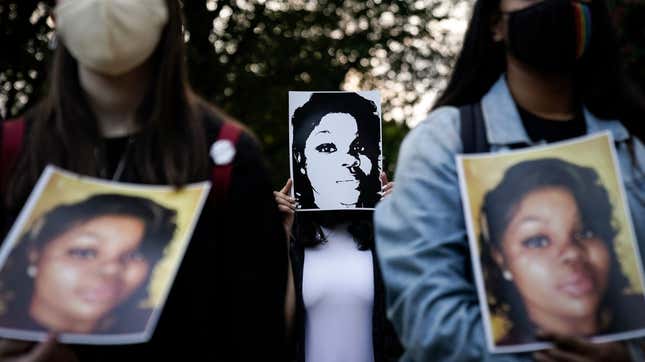The Justice System Protected Breonna Taylor's Killers, As it Was Designed to Do
Politics

Breonna Taylor’s name and likeness have been immortalized on protest signs, magazine covers, Instagram posts, cringeworthy memes, and even t-shirts worn during the Emmys. There is a law named after her in Kentucky, banning the very same “no-knock warrants” that led to Louisville police officers shooting Taylor to death in her own home in March. She has become a household name, a grim fixture following a long summer marked by protest. And on Wednesday, it felt like the call for something akin to justice was all in vain: Kentucky’s attorney general announced that one of the officers involved in the raid was indicted on “wanton endangerment” charges against Taylor’s neighbor. Little more than a slap on the wrist. There were no charges against the two officers who killed Taylor.
It’s unsurprising that those officers were not charged with Taylor’s murder or even manslaughter. As journalist Shaila Dewan noted in the New York Times, “Few police officers are ever charged with murder or manslaughter when they cause a death in the line of duty, and only about a third of those officers are convicted.” But who needs statistics when one can simply look at the deaths of countless unarmed Black people killed by police, and consider the lack of serious indictments that followed? Aiyana Jones, Michael Brown, Eric Garner, Tamir Rice, Philando Castile. The last decade has been haunted by high-profile examples of Black Americans whose deaths spur brief pauses of reflection and a flurry of media analyses of policing in America, only to be put on the back burner and ignored until yet another person dies.
The cycle is endless, up to the collective questions about what justice looks like. Is it a carceral option of locking up the offending officers or something more nuanced? Is mere indictment victory enough? Is it a cash payout to grieving families, like the $12 million settlement awarded to the Taylor family following a wrongful death lawsuit? Is it reform? Is it the re-allocation of police funds? Is it the abolishment of policing as we know it? Is a grieving family’s idea of what justice looks like more important than the vision of justice for protesters and activists moved to action by that death?
There will always be another death to feed the discourse, but there is one thing that many can agree on: This isn’t justice. The fact that the officers who shot Taylor were not charged with a crime is not even a pale imitation of justice.
-

-

-

-

-

-

-

-

-

-

-

-

-

-

-

-

-

-

-

-

-

-

-

-

-

-

-

-

-

-

-

-

-

-

-

-

-

-

-

-








































